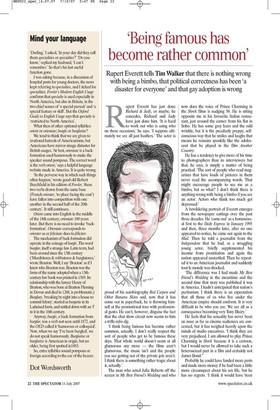Mind your language
'Darling,' I asked, 'In your day did they call them specialities or specialties?' Do you know,' replied my husband, 'I can't remember.' So that's his last useful function gone.
I was asking because, in a discussion of hospital posts for young doctors, the news kept referring to specialties, and I itched for specialities. Fowler's Modem English Usage confirms that specialty is used especially in North America, but also in Britain, in the two chief senses of 'a special pursuit' and 'a special feature or skill'. But the Oxford Guide to English Usage says that specialty is 'restricted to North America'.
What then of other optional syllables: orient or orientate; burgle or burglarise?
We tend to think that we are given to irrational hatreds of Americanisms, but Americans have mirror-image distastes for British usages. 'At best, orientate is a backformation used humorously to make the speaker sound pompous. The correct word is the verb orient,' says a helpful language website made in America. It is quite wrong.
'In the perverse way in which such things often happen,' wrote good old Robert Burchfield in his edition of Fowler, 'these two verbs drawn from the same base (French orienter, 'to place facing the east') have fallen into competition with one another in the second half of the 20th century'. It still continues.
Orient came into English in the middle of the 18th century; orientate 100 years later. But there is no need to invoke 'backformation'. Orientate corresponds to orienter as or felicitate does to feliciter.
The mechanism of back-formation did operate in the coinage of burgle. The word burglar, itself a strange law-Latin term, had been around since the 13th century ('Murdritores & robbatores & burglatores,' wrote Bracton. Well, I say 'Bracton' as if I knew who Bracton was. Bracton was the form of the name adopted when a 13thcentury law book was printed in 1569. Its relationship with the lawyer Henry of Bratton, who was born at Bratton Fleming in Devon and died in 1268, is problematic.) Burglary, 'breaking by night into a house to commit felony', started as brugaria in its Latinised form, and settled down with an '1' in it in the 16th century.
Anyway, burgle, a back-formation from burglar, was a verb not seen until 1872, and the OED called it 'humorous or colloquial'. Now, when we say 'I've been burgled', we do not speak humorously. Burglarise or burglarize is American in origin, but no older, being first spotted in1883.
So, extra syllables sound pompous or foreign according to the ear of the hearer.
Dot Wordsworth

















































 Previous page
Previous page